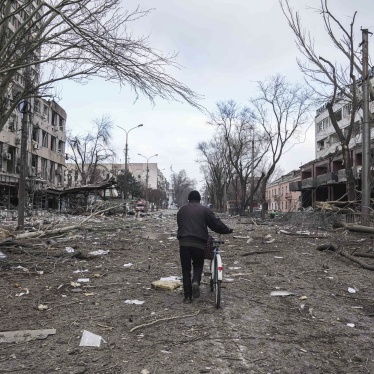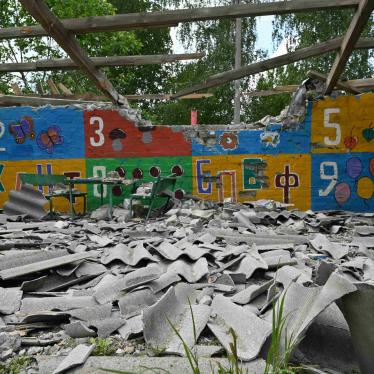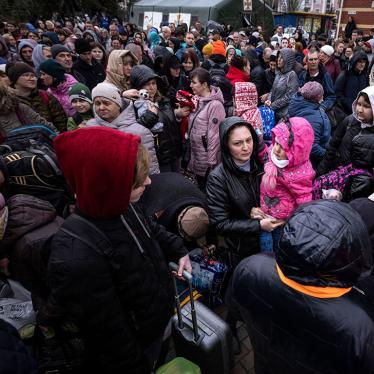(Kyiv, December 20, 2023) – Russian authorities continue to conscript Ukrainian civilians in occupied areas or otherwise try to forcibly enlist them, including those in detention, into the Russian military, Human Rights Watch said today. Russia’s practice of compelling Ukrainian residents in occupied areas to serve in its armed forces is a war crime.
“Russian authorities openly and unlawfully force men in occupied areas of Ukraine to fight against their own country,” said Hugh Williamson, Europe and Central Asia director at Human Rights Watch. “Less visible is their practice of pressuring Ukrainian civilians in detention, who have nowhere to hide or flee, to join the Russian forces.”
Human Rights Watch interviewed by phone three men in pretrial detention in parts of Donetska region that are currently under Russian occupation. All three said that they have been held there since before Russia’s February 2022 full-scale invasion, and that military officials of the so-called Donetsk People’s Republic have tried to pressure them to join the so-called DNR forces, using intimidation, threats, and propaganda. The men also said that the pressure has intensified in recent months. A Ukrainian lawyer representing one of the men told Human Rights Watch that she is aware of at least 11 similar cases.
One of them, 38-year-old “Yurii” (name changed to protect the man’s security), told Human Rights Watch that since October 2022, local prison administration and law enforcement officials have been regularly coming to the facility, distributing “volunteer enlistment” applications among detainees, and pressuring detainees to sign them. Yurii has continually refused. He said that detention facility staff have repeatedly raided the cells of detainees they were pressuring to enlist, including his.
A month later, he said, he was placed in a damp, cold, and overcrowded cell with 12 other people, most of whom had active tuberculosis. He and other detainees were deprived of water for extended periods and frequently given rotten or moldy food. “When we complain, they respond: ‘if you don’t like the conditions here, going to war is your way out,’” he said.
Yurii said that during one of their visits to the detention facility in July 2023, DNR military officials threatened to send him and other detainees to the front lines.
Another detainee, “Olexander,” (name changed to protect the man’s security) told Human Rights Watch that to his knowledge, hundreds of detainees from the facility he was held at had been sent to areas of active fighting and most did not survive. “The propaganda is very active here,” he said. A third man confirmed to Human Rights Watch that he and other detainees were regularly pressured to join Russia’s armed forces.
Appalling conditions in the detention facilities make inmates especially vulnerable to coercion to enlist, Human Rights Watch said. Yurii said that since November 2022, he lost 20 kilograms and his health deteriorated significantly due to the detention conditions. Olexander said that he spent five years in a cell with no heating, where walls were covered in ice, and that the detainees haven’t had access to running water for over a year.
A Ukrainian lawyer, who has been representing one of the men since before the full-scale invasion, said that she is aware of other detainees in a similar situation: “The administration comes regularly and brings them enlistment forms, pushing them to ‘volunteer.’… Many detainees have already agreed. Those who agree are sent immediately to the front lines, no training, nothing.”
“Those who refuse, the [DNR officials] come to the facility and ask them: ‘Do you need more time to think?’ and they end up in the basement,” the lawyer said, alluding to a well-documented practice of torturing detainees in the basement of detention facilities. “They are in a desperate situation. They are being forced to fight against their own country.”
Russia is also unlawfully conscripting Ukrainian civilians in occupied areas, who are not in detention. In its December 2023 report, the United Nations Human Rights Monitoring Mission in Ukraine described pressure on men in occupied areas to join Russian armed forces. The report referred to seven cases in which men were conscripted and deployed to the front line.
In October, Russian authorities started their routine fall conscription campaign, which included Russia-occupied parts of Ukraine’s Khersonska, Zaporizka, Donetska, and Luhanska regions. In September 2022, President Vladimir Putin signed a decree claiming to annex these occupied areas, following sham “referendums” with hastily staged voting, sometimes at gunpoint. In September 2022, Russian authorities announced “partial mobilization” in Russia. Russia officially integrated the armed forces of the so-called Donetsk People’s Republic and Luhansk People’s Republic into the Russian military in October 2022.
The Ukrainian mayor of Melitopol, a city in the occupied part of Zaporizka region, told Human Rights Watch that the occupying authorities have been pushing mobilization efforts in the area since September 2022. In the months following a sham referendum, the mayor, Ivan Fedorov, said, the occupying authorities have unsuccessfully tried to mobilize local residents to join so-called “volunteer battalions.”
Fedorov also said that the occupation authorities opened a conscription office in Melitopol and that in July, the Russia-installed deputy head of Zaporizka regional administration, Evheny Balytsky, announced that every company in the region with at least two employees was required to submit a record of all employees to the military authorities. “Russians understand that Ukrainian people don’t want to fight other Ukrainians,” Fedorov said. “So they find every way to pressure them.”
Since occupying Crimea in 2014, Russian authorities have held 18 unlawful conscription campaigns that disproportionately affected Crimean Tatars, forcing many of them to flee. Between 2014 and 2021, Russia conscripted close to 30,000 Crimean men. Many were sent to serve at military bases in Russia, a practice explicitly prohibited by international humanitarian law.
Russia regularly carries out military propaganda campaigns in Crimea, including among children, also in violation of international humanitarian law. In a written communication to Human Rights Watch, the office of the Permanent Representative of the President of Ukraine in the Autonomous Republic of Crimea, estimated that as of July 2023 the total number of men conscripted in Crimea since the start of the occupation was 42,000 to 43,000.
Starting in September 2022, Russia carried out mobilization of Crimean residents into Russia’s armed forces. During mobilization, occupation authorities handed out an estimated 20,000 to 25,000 enlistment notices in Crimea, according to the office of the permanent representative. Crimean human rights activists estimated that, in some areas, 90 percent of draft notices were handed to Crimean Tatars. The Council of Europe´s Commissioner for Human Rights stated, in her April report, that Russian mobilization units visited areas densely populated by Crimean Tatars, and that at least 1,500 draft notices had been given to Crimean Tatars.
Although Human Rights Watch does not know the total number of Crimean Tatars conscripted or forcibly enlisted into the Russian army that has been mobilized to fight in mainland Ukraine, credible sources have reported that they are aware of a number of such cases.
International humanitarian law explicitly prohibits a party to an armed conflict from compelling residents of the territories it occupies or effectively controls to serve in its armed or auxiliary forces. The Hague Regulations of 1907 forbid Russia from compelling Ukrainian nationals from taking part in military operations directed against their own country. Under the Fourth Geneva Convention of 1949, Russia is also prohibited from any “pressure or propaganda which aims at securing voluntary enlistment.” These prohibitions are absolute, and their violation may constitute a war crime.
“Pressuring Ukrainians to fight against their own country is depraved and illegal,” Williamson said. “Russia should stop this practice immediately.”






